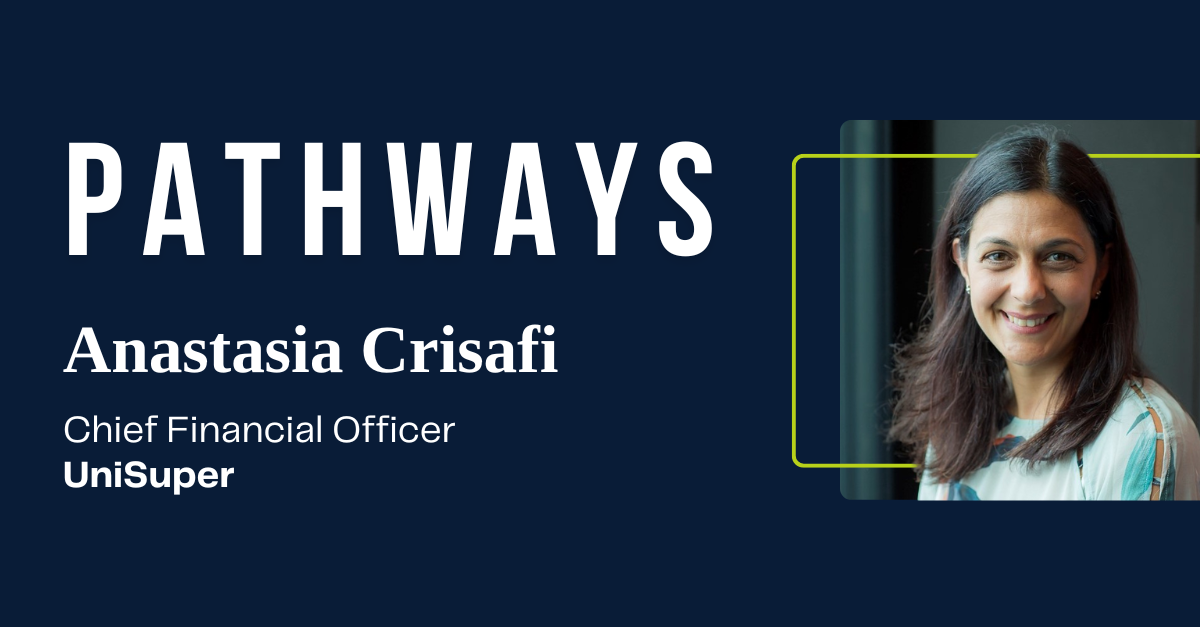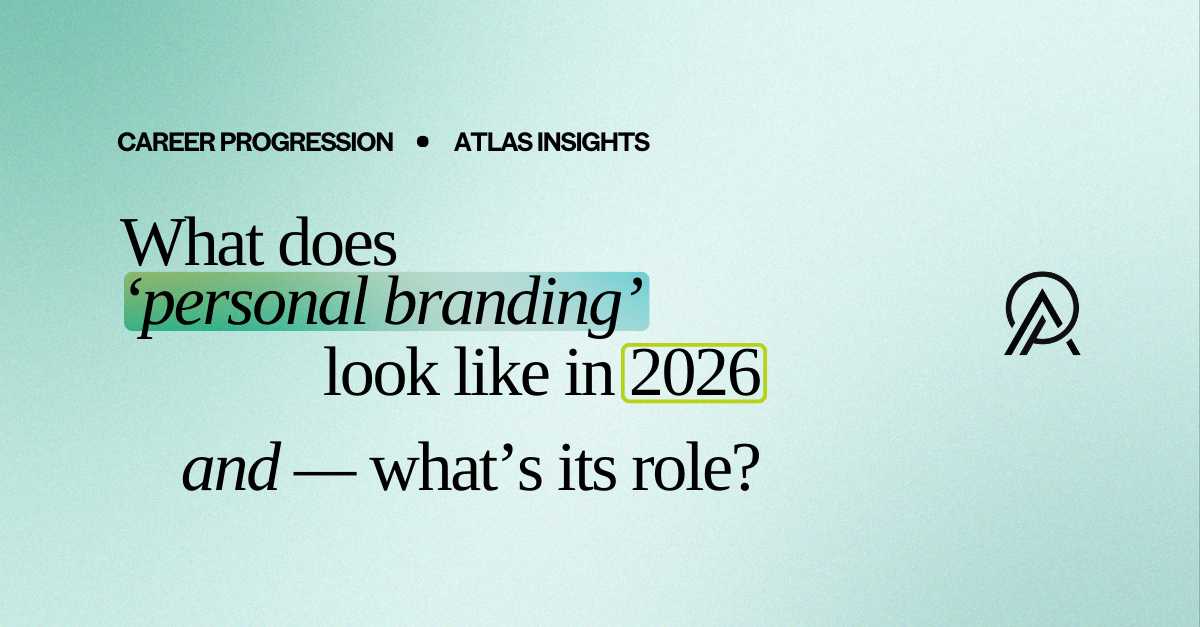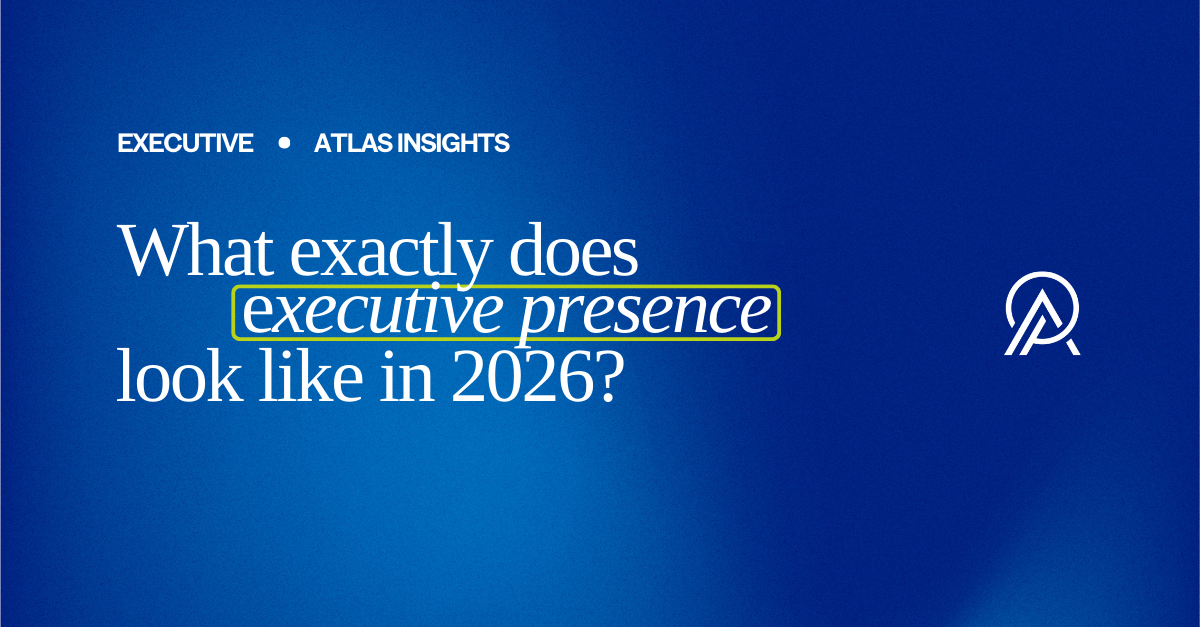
For Anastasia Crisafi — once an aspiring filmmaker — a career in finance was simply her ‘plan B’. Well, what a backup plan it’s turned out to be — with formative roles at Ernst & Young, Coles Group, and over a decade with Link Group, Anastasia is now the CFO of UniSuper. She has built a reputation for transforming teams, navigating complex transactions, and leading with authenticity. Now overseeing finance and corporate services at one of Australia’s largest super funds, she’s passionate about purpose-driven work, diversity of thought, and creating cultures where people thrive.
Anastasia joined Atlas Director, Liam Killen for our Pathways Podcast to reflect on the lessons, leadership shifts, and sliding door moments that shaped her journey — and why surrounding yourself with stars might just be the smartest move a leader can make.
Liam Killen
I’m joined today by Anastasia Crisafi, CFO of UniSuper. Anastasia, thanks so much for joining me.
Anastasia Crisafi
Thanks for having me, Liam. It’s a pleasure.
Liam Killen
Let’s start at the beginning. What first drew you into a career in finance?
Anastasia Crisafi
Well actually, I originally wanted to go into the theatre or film world. I did a double degree at Melbourne Uni with a cinema studies major and then tacked on commerce and accounting — on the basis that maybe I wouldn’t be in front of the screen, but I could do something behind it. Accounting was where I thought I might land. So, to be honest, something else got me here — and I’ve never left.
Liam Killen
We have to touch on this — film. Why film? I personally wanted to be a filmmaker in high school but quickly realised I didn’t have a creative bone in my body. Perhaps that’s why I do this! What was it about film for you, and how far along did you get?
Anastasia Crisafi
I loved it. I did a lot of acting in high school and absolutely adored it. But by 17 or 18, I started thinking, “Oh no, the camera” — I just didn’t want to be in front of it anymore. But I really loved the production side. I wouldn’t call myself creative, but I love working with creative people — it stimulates me. I love how everything’s thought out — from lighting to where someone’s standing, to their voice, everything.
I majored in cinema studies at uni and absolutely loved it. But I knew it wasn’t an easy industry to get into, so I got my accounting background and ended up at Ernst & Young. Things changed from there. As you evolve in that world — moving between companies, especially as an auditor — you gain different experiences. I went to the UK for two years, which opened my eyes to other industries. Then I came back and joined Coles Myer, and I have to say, I loved that too. Retail was fantastic — so many great opportunities came my way.
I actually interviewed with Village back then — that was probably my sliding doors moment. I could have gone into the film industry but chose retail instead. Life changes. Probably a good move, looking at where things are today.
Liam Killen
Probably a good one. You started out in external audit, what did that period teach you about business and problem solving?
Anastasia Crisafi
It gave me such a strong foundation. It was tough — long hours, weekends, and we were paid very little compared to today’s grads. But the training in controls, governance, processes, people — it was invaluable. There was also a lot of leadership and behavioural training. And working across a variety of big listed companies helped me understand how different businesses operate.
Even though I’m not in risk, I understand risk. I understand processes, controls — all the fundamentals of being in finance. That grounding really set me up for everything I’ve done since.
Liam Killen
You spent over a decade at Link Group. Talk us through that time — what kept you there and engaged over those 13 years?
Anastasia Crisafi
I started at Superpartners, which was later bought by Link Group. What kept me there was actually my interest in superannuation. Superpartners was formed by the large super funds that still exist today, and when it was sold to Link, they became the administrator of those funds.
I became divisional CFO for the super business, and I was also given responsibility for IT across Link Group globally, as well as all corporate functions. I had teams in London, Sydney, Melbourne, and indirect lines into India, where a lot of our corporate administration services were based.
What kept me interested was the diversity of the work. I wasn’t just doing business partnering — I was involved in acquisitions, divestments, and eventually the sale of Link. It was broad, and that prepared me really well for where I am today.
The same happened at Coles Group, which was also a key part of my career. I started in internal audit, which I didn’t enjoy, and quickly moved into a Sarbanes-Oxley manager role, then into investor relations. That was a huge learning curve — dealing with analysts and shareholders gave me the confidence to speak to external parties and a deeper understanding of the business.
Liam Killen
You have quite a breadth of experience. Was that something deliberate, or did it evolve naturally?
Anastasia Crisafi
It definitely wasn’t deliberate. The only plan I ever had was to work in film, and I didn’t even end up there! None of my career was really planned — it was just opportunities that came my way.
A lot of them were roles I didn’t think I could do, but I had people around me who believed I could. I had great mentors and a lot of encouragement. So when opportunities came, I took them — and those experiences, both good and bad, shaped who I am today.
Liam Killen
What were some of the key moments that really stretched you?
Anastasia Crisafi
Definitely investor relations at Coles. That was a real stretch. We were dealing with tough analysts at a time when Coles was seeing zero growth. It was leading to the eventual sale of Coles Group, and we were in the papers every day with some kind of leak — pretty nasty times.
It taught me resilience. You had to be honest with analysts — lying wasn’t an option — but you also didn’t want them to run the company down. It was such a fine balance. I learned so much from the CEO, CFO, and head of legal during that time — not just from what they did well, but also from what not to do. Those moments really show you how people behave under pressure.
The divestment of Link Group was also a big learning experience. It taught me about process, detail, and working with incredibly strategic, knowledgeable people. Finance professionals don’t buy and sell companies every day, so having that exposure was a great way to build new skills.
Liam Killen
Coming to today — what was the biggest shift or surprise when you stepped into the CFO role at UniSuper?
Anastasia Crisafi
For me, it was stepping into a broader role than just finance — it included corporate services, procurement, facilities, and more. Two big challenges stood out: one was being tasked with building a data office from scratch, because there wasn’t one. That was a big job.
The other was cultural. When I joined, employee satisfaction in the team was in the 60s. People didn’t know or talk to each other. It was really eye-opening. It took about two and a half years to turn that around, and that’s probably the most satisfying part of my role so far.
Liam Killen
Now that you’ve had time to reflect, what does success look like beyond just the financial targets?
Anastasia Crisafi
Success is continuing to have a team that actually wants to come to work and is very united and diverse. For me, a big part of my role and my own beliefs and values is around ensuring we have diversity. And that’s really because it is an advantage to the way that we think and the way that we do things. I have been able to develop that in the team.
So to me, that’s success. If I can maintain high employee satisfaction and have diverse methods of thinking, then we will have a very successful team. And a very successful team is my measure of success. It’s not so much your financial metrics. Anyone can do that. It’s more around how are we delivering as a team.
Liam Killen
How would you describe your leadership style? Has it changed over time?
Anastasia Crisafi
Oh yeah, 100%. It changes because you’re exposed to both good and bad leaders, and you learn how to be better. You have to be open to that. For me, the biggest change has been listening more. Less of me talking, more listening. That’s really important, and I find it even more so now in any leadership interaction.
Also, never being afraid to say what you think — just being mindful of how you say it. If you’d seen me years ago compared to now, that’s probably the biggest shift. I used to get into trouble for saying what I thought too bluntly. It’s not about not speaking up, it’s about thinking through how you communicate. That’s something I’ve learned to do much better.
Liam Killen
You mentioned being proud of leading a fund that values diversity. What is it about diversity that’s particularly important to you?
Anastasia Crisafi
When I think about who our members are, they’re incredibly diverse. That’s one of the things I love most about working for a super fund rather than an ASX-listed company. In a listed company, the focus is all about shareholders — returning profit, dividends — and when you can’t increase revenue, that usually means cutting costs, often without much thought for long-term impact. It’s very short-term focused.
A super fund, on the other hand, is about the member. Everything we do is for their benefit. And if our members are diverse, then our workforce and leadership need to reflect that. Otherwise, we won’t understand their needs — we’ll only have one lens. I value diversity because it brings new ideas, fresh thinking, and healthy challenge. I thrive on that. It’s always been my philosophy when taking roles: can I learn from my boss and from those around me?
Liam Killen
Reflecting on those different environments — especially Coles, which was highly commercial and investor-focused — versus now, where it’s more member-centric, has your own sense of purpose evolved?
Anastasia Crisafi
Yes, absolutely — 100%. Coles was commercial but also very customer-focused, which I respected. That got a bit lost in my next role, but it’s definitely come back at UniSuper in a more meaningful way.
As I’ve gotten older — let’s call it my “older phase” — purpose has become much more important. It really matters to me now that what I do has meaning, that it impacts people’s lives and their retirement. That’s a big shift from 20 or 30 years ago. You want to feel like what you’re doing plays a real role in something bigger.
Liam Killen
Let’s step into the advice corner now — what advice would you give your younger self at the start of your career?
Anastasia Crisafi
I’d tell myself to have more confidence — from the beginning, right through to now. “Back yourself” is the advice I’d give, and the advice I give others.
Generally — and I am generalising — but women often don’t think they can do a job unless they can tick 100% of the boxes. That was definitely true for me. Whereas I’ve seen men walk in confidently claiming they can do it, even if they’re only at 60%.
So if you’re at 80%, that’s already bloody good — and you can learn the rest. Confidence is what helps you step up into new roles and keep pushing yourself. That’s something I wish I’d understood 30 years ago — and even five years ago.
Liam Killen
Have there been any specific practices or mindset shifts that helped you as you moved into executive roles?
Anastasia Crisafi
I think it’s about being exposed to other executives and observing how they work. You start to realise — if they can do that, and present themselves as confident and knowledgeable (even when they might not be) — then why can’t I?
That’s the learning: exposure gives you insight into what’s possible. You see the skills they use, and you can adopt what works for you. And sometimes, you also see things you never want to emulate. That’s just as valuable — knowing what doesn’t align with your values, and making sure you lead differently.
Liam Killen
What’s one thing about leadership that you wish more people understood?
Anastasia Crisafi
A CEO once gave me the best advice: “Surround yourself with stars, and you’ll be a star.” You don’t need to be the smartest person in the room. If you’ve got a team full of brilliant people and you empower them—that’s what leadership is about. Let them shine, and you will shine too. That piece of advice has stuck with me for over 20 years, and it’s still the best I’ve ever received.
Liam Killen
Looking ahead, what excites you most about the future of finance and superannuation?
Anastasia Crisafi
I’m excited about automation and where it’s taking us. There’s this idea floating around that accountants won’t exist in a few years — I don’t agree. I think we’ll have tools that eliminate the repetitive, manual, boring parts of our jobs.
I mean, when I started out, I was using red and green pens to tick through massive audit files! That’s all changed. What’s ahead is a more strategic version of finance, where accountants bring real insight and value to organisations. That’s exciting.
Liam Killen
What’s one area you’re currently focused on developing?
Anastasia Crisafi
Right now, I’m working on how to frame better questions. As accountants, we can be very direct — we cut through waffle quickly. If someone’s going on and on, I’ll sometimes just talk over them because I want to get to the point.
But in my current role, which is much broader than just finance, I’ve had to learn to step back. Let people speak. Listen more. And then frame questions in a way that actually encourages dialogue. That’s something I’m actively working on.
Liam Killen
It’s a hard skill to master. And if you could be remembered for just one thing, what would it be?
Anastasia Crisafi
That I turned around the satisfaction and culture of our team. It was low when I started, and now it’s high — people genuinely love working together. I created stars. That’s what I’d love to be remembered for.
Liam Killen
Let’s close with some rapid-fire questions. What’s a film, play, or series not many people know about that you think they should?
Anastasia Crisafi
I loved film noir — we studied it at uni. Not many people know about it because it’s in black and white, and kids today wouldn’t even recognise that! But Gilda is a good one. I love that in film noir, the woman is the “bad guy.”
Liam Killen
I think I know the answer to this, but if you weren’t in finance, what would you be doing?
Anastasia Crisafi
You don’t know the answer! I actually considered leaving finance about 10 years ago to become a midwife. I didn’t in the end, for various reasons — but it was on the table.
Liam Killen
And finally, what’s your coffee order?
Anastasia Crisafi
Soy latte.
Liam Killen
Excellent. Anastasia Crisafi, thanks so much for joining me.
Anastasia Crisafi
Thanks, Liam. Really appreciate it. Thank you.




